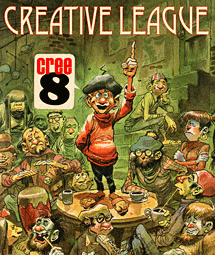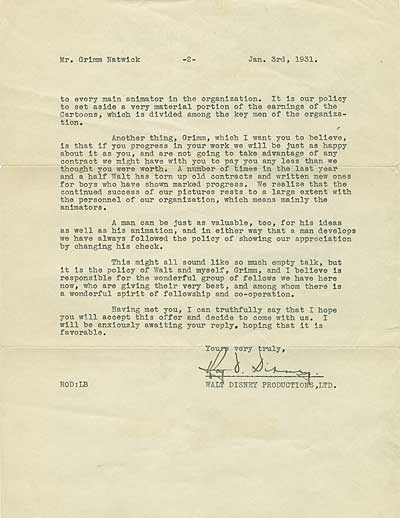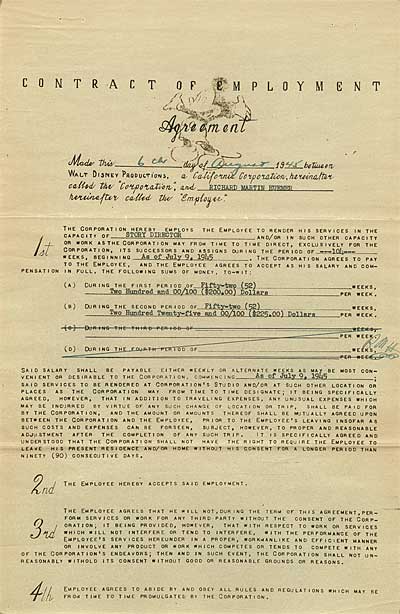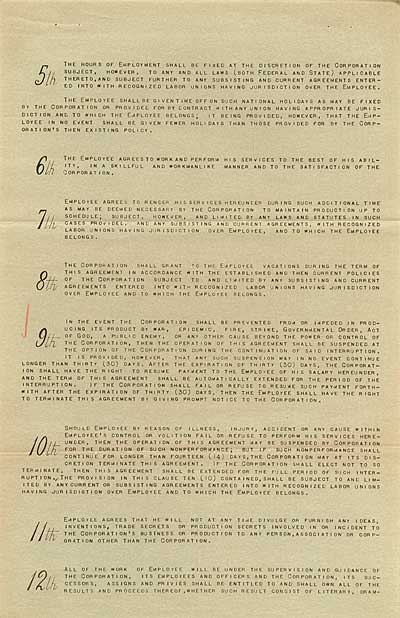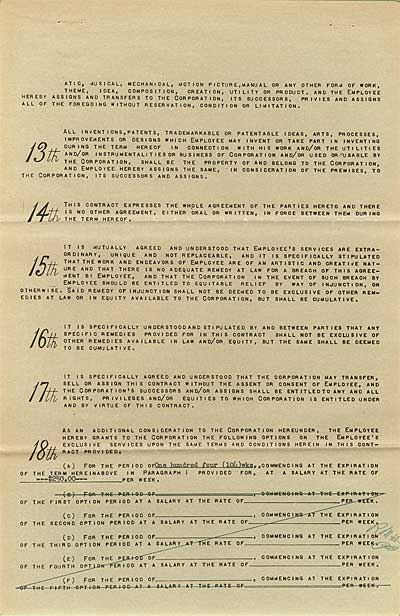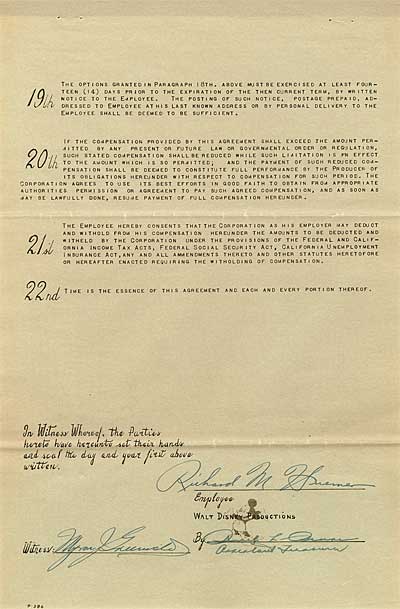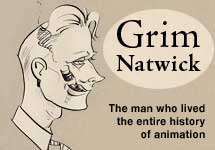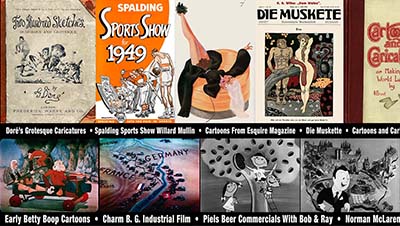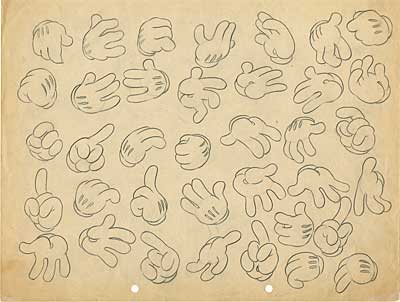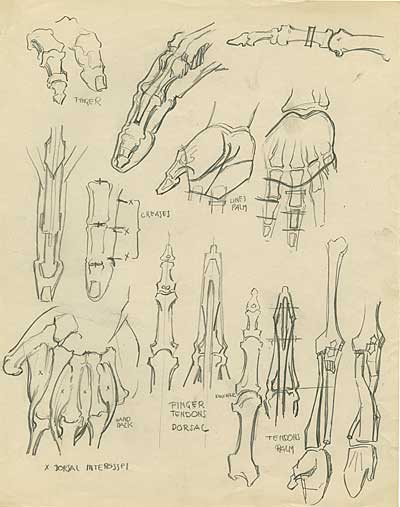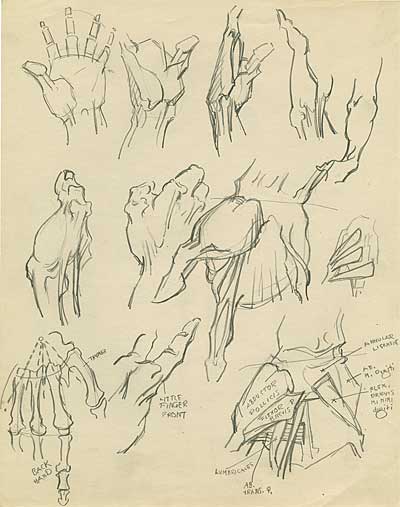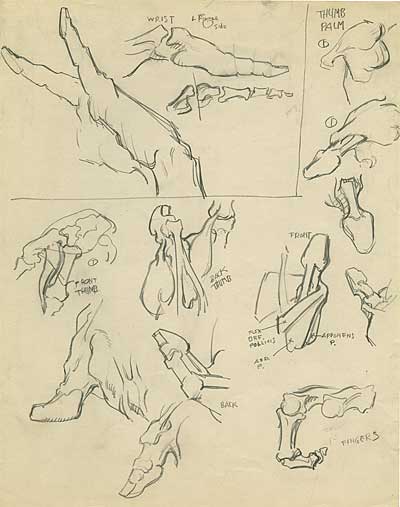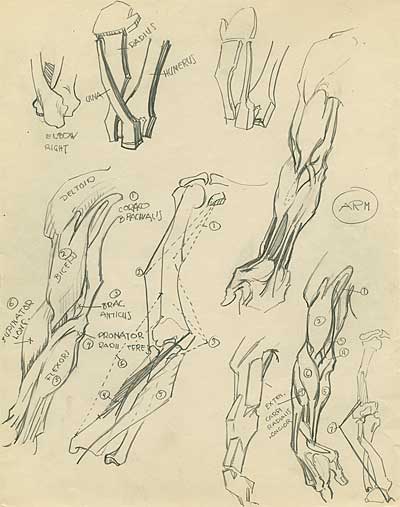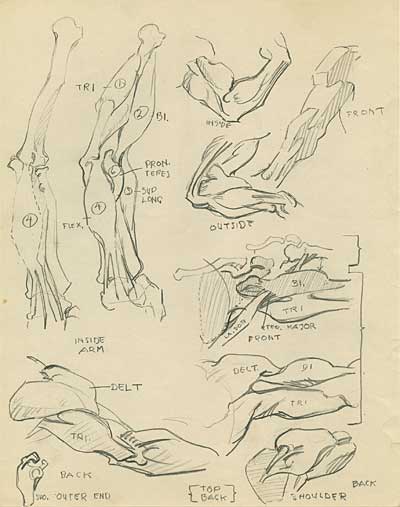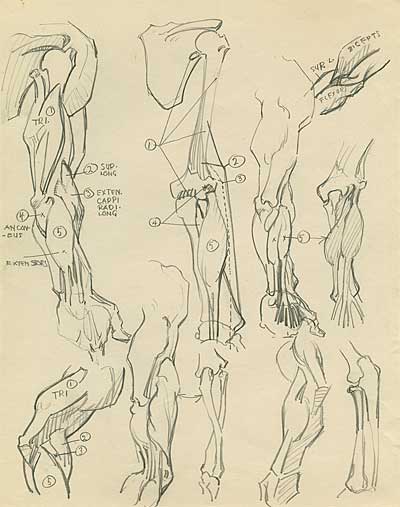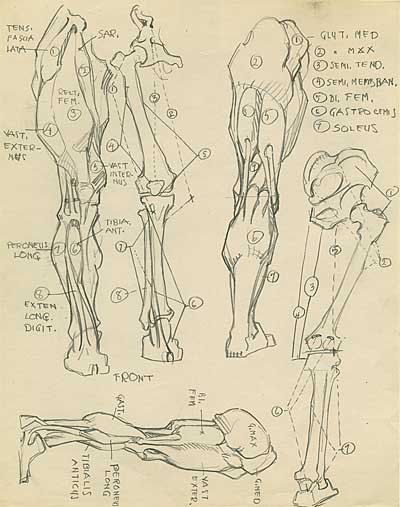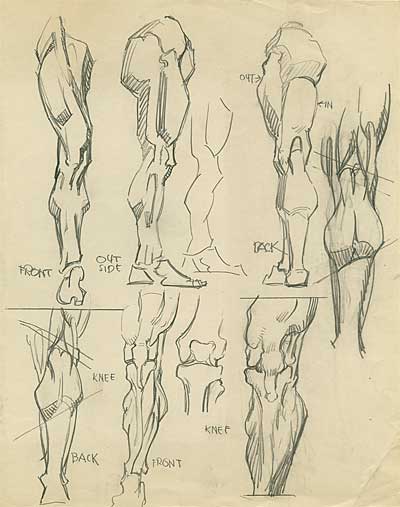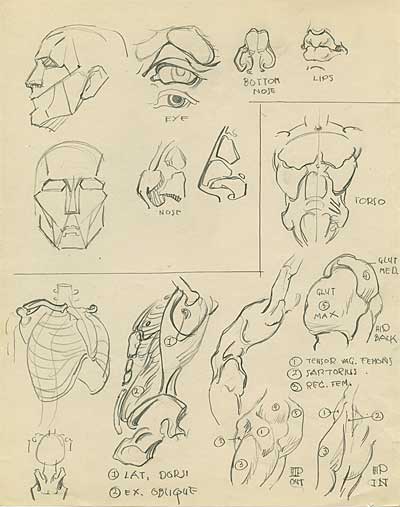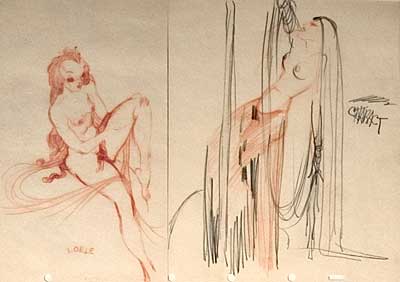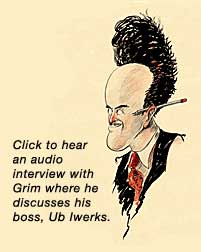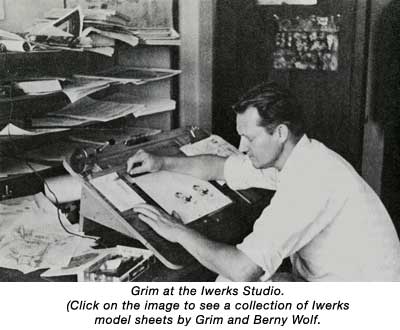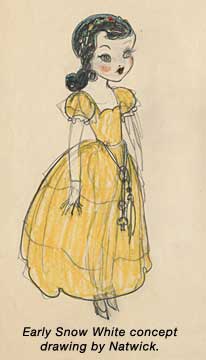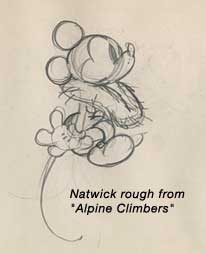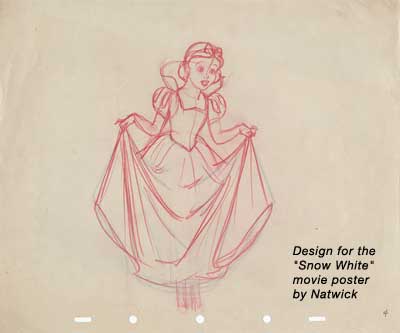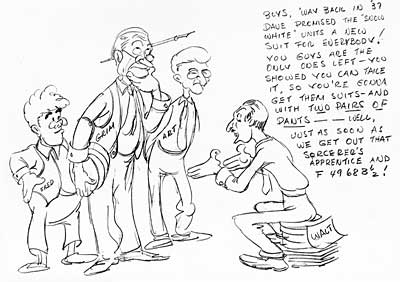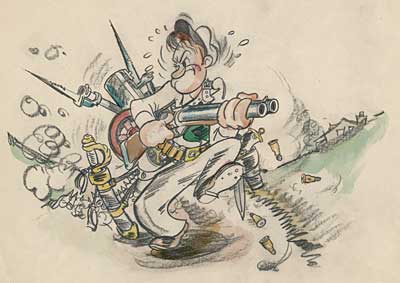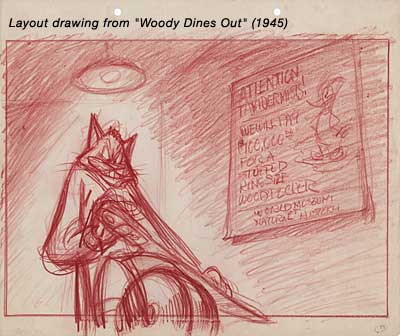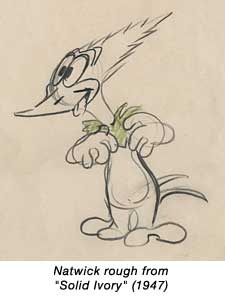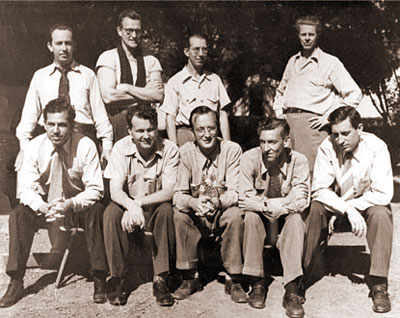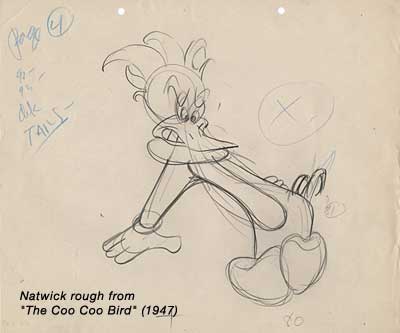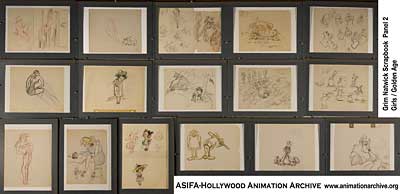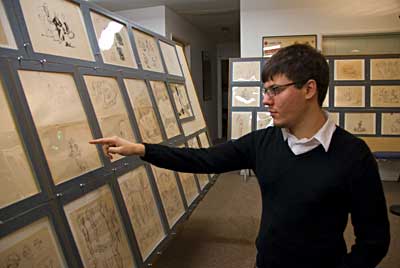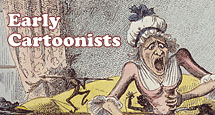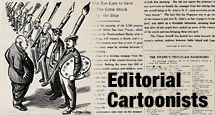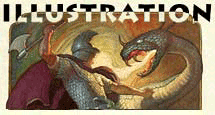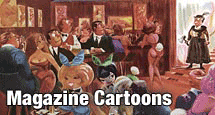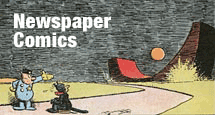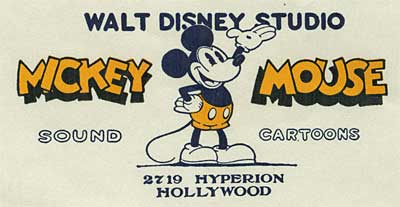
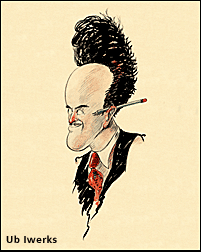
![]() In 1930, Ub Iwerks unexpectedly quit Disney to form his own studio with Pat Powers. This left Disney in a very tough position. He had contracts to fill for cartoon shorts without a lead man to supervise. Disney hired Ted Sears away from Fleischer, and encouraged him to recruit other top animation talent in New York to fill the void left by Iwerks’ departure. Sears’ top prospect was his coworker at Fleischer, Grim Natwick.
In 1930, Ub Iwerks unexpectedly quit Disney to form his own studio with Pat Powers. This left Disney in a very tough position. He had contracts to fill for cartoon shorts without a lead man to supervise. Disney hired Ted Sears away from Fleischer, and encouraged him to recruit other top animation talent in New York to fill the void left by Iwerks’ departure. Sears’ top prospect was his coworker at Fleischer, Grim Natwick.
Grim was comfortable in New York, and hadn’t considered moving West, but Sears told him that Disney was doing great work and there was money to be made. When Sears relocated to Hollywood, Natwick sent word with him that he was willing to talk with Disney about making the move. Roy Disney wasted no time in making the trip to New York to try to get Grim to commit. Grim invited him over to his apartment, and they spent the afternoon relaxing, eating and listening to a ball game on the radio- doing just about everything but talk business.
When time came for Roy to leave, he asked Grim what it would take to get him to join Disney. Grim really didn’t want to move, but he thought Roy was a nice guy, and he didn’t want to hurt his feelings. So he told him that he would go to Hollywood for $400 a week. (At that time, he was making $50 a week at Fleischer!) Roy told him that he would have to discuss it with Walt, and he would get back to him. Grim figured that he wouldn’t hear back, but a couple of weeks later, this letter arrived in the mail…
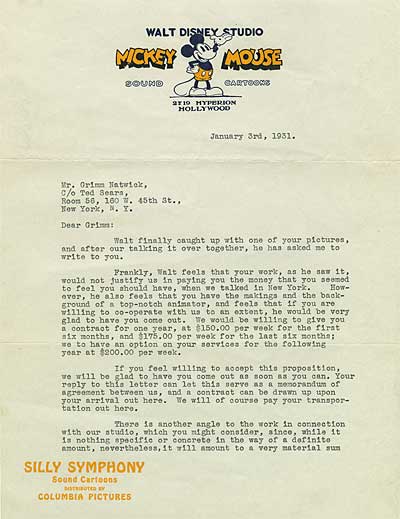
Grim was always the sort of person who welcomed new opportunities, and the prospect of making nearly three times what he was being paid by Fleischer was enough to make him willing to go West. He called a few of his friends who had already made the trip to Hollywood and asked them if the Disney brothers were on the level. His friends told him about Iwerks’ unfriendly departure from the studio, and they explained that Walt and Roy were just businessmen- that Iwerks had been the real creative spark behind Mickey Mouse. Some of Grim’s coworkers at Fleischer had already joined Iwerks at his studio in West Los Angeles, so Grim had them offer his regards to Ub. Within a few weeks, Grim was packed up in his car driving West to work for Iwerks for $75 a week!
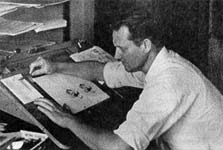
![]() In his later years, Grim would laugh about being crazy enough to pass up $200 a week in the height of the depression. It’s likely that no one at the Disney Studio without the Disney surname was making that much at the time. Grim made a good choice though. When he arrived, Iwerks handed over the day to day supervision of the films to him, and he directed some wonderful Flip the Frog, Willie Whopper and Comicolor cartoons along with many of the same kid animators he had supervised at Fleischer. When Grim heard that Disney was starting work on a cartoon feature in 1934, he couldn’t hold off any longer. He joined the Disneys and did the lion’s share of the animation of the title character in Snow White.
In his later years, Grim would laugh about being crazy enough to pass up $200 a week in the height of the depression. It’s likely that no one at the Disney Studio without the Disney surname was making that much at the time. Grim made a good choice though. When he arrived, Iwerks handed over the day to day supervision of the films to him, and he directed some wonderful Flip the Frog, Willie Whopper and Comicolor cartoons along with many of the same kid animators he had supervised at Fleischer. When Grim heard that Disney was starting work on a cartoon feature in 1934, he couldn’t hold off any longer. He joined the Disneys and did the lion’s share of the animation of the title character in Snow White.
For more on this subject, see… Grim Natwick’s Scrapbook
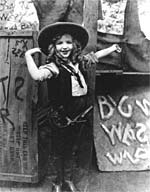
![]() Virginia Davis played the live action Alice in Disney’s Alice Comedies, beginning with the first film, "Alice’s Wonderland" in 1923. Her family relocated to Hollywood from Kansas City to follow Disney, and in 1925, her mother decided the time had come to demand more money for her services. There was no lack of child actresses in Hollywood at the time, so Walt and Roy promptly called the bluff and replaced her. Virginia’s mother went to the department store and bought dolls of every major cartoon star of the day, and photographed Virginia holding them. She sent the photos to the producers of the cartoons, along with a letter subtly suggesting that “Disney’s Alice likes your cartoons!” It didn’t result in any jobs for the young actress, but it did produce one very interesting letter in response…
Virginia Davis played the live action Alice in Disney’s Alice Comedies, beginning with the first film, "Alice’s Wonderland" in 1923. Her family relocated to Hollywood from Kansas City to follow Disney, and in 1925, her mother decided the time had come to demand more money for her services. There was no lack of child actresses in Hollywood at the time, so Walt and Roy promptly called the bluff and replaced her. Virginia’s mother went to the department store and bought dolls of every major cartoon star of the day, and photographed Virginia holding them. She sent the photos to the producers of the cartoons, along with a letter subtly suggesting that “Disney’s Alice likes your cartoons!” It didn’t result in any jobs for the young actress, but it did produce one very interesting letter in response…
This letter is from Charles Mintz– the man who, along with his wife Margaret Winkler, engineered the takeover of the Disney Studio in 1928. Yes, this letter is proof that Disney’s “Alice” offered to work for the man who stole Disney’s “Oswald”!
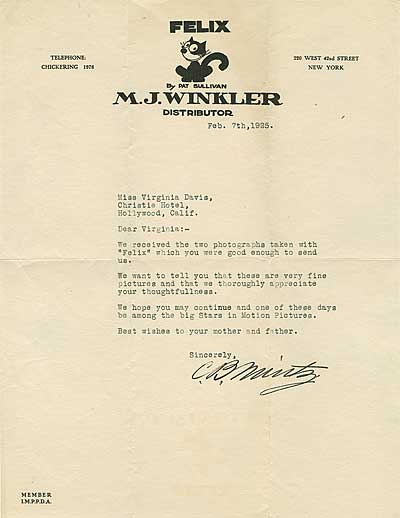
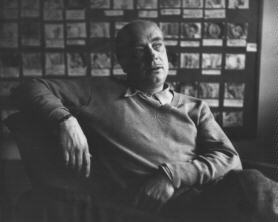
![]() I stumbled across a pair of contracts between Dick Huemer and the Disney Studios. The first was dated 1936, and the one I’m posting here is from 1945. The two documents are identical, with one small exception… the insertion of the clause, “…subject further to any subsisting and current agreements entered into with recognized labor unions having jurisdiction over the Employee”. This simple phrase was brought about by a battle that almost tore the studio apart. The fascinating story of the Disney strike is told in Tom Sito’s new book Drawing The Line. I hope that Tom or Steve Huelett will remark further on this document in the comments below and in The Animation Guild Blog.
I stumbled across a pair of contracts between Dick Huemer and the Disney Studios. The first was dated 1936, and the one I’m posting here is from 1945. The two documents are identical, with one small exception… the insertion of the clause, “…subject further to any subsisting and current agreements entered into with recognized labor unions having jurisdiction over the Employee”. This simple phrase was brought about by a battle that almost tore the studio apart. The fascinating story of the Disney strike is told in Tom Sito’s new book Drawing The Line. I hope that Tom or Steve Huelett will remark further on this document in the comments below and in The Animation Guild Blog.
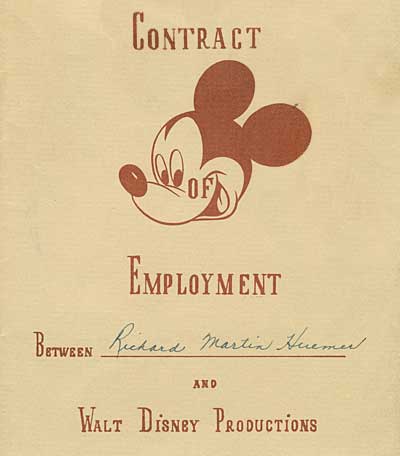
For more information on Dick Huemer’s amazing career, see… Dick Huemer’s Family’s Site.
Stephen Worth
Director
Animation Resources
This posting is part of an online exhibit entitled Grim Natwick’s Scrapbook.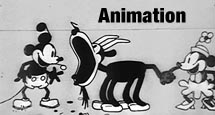
![]()
This posting is part of the online Encyclopedia of Cartooning under the subject heading, Animation.
THIS IS JUST THE TIP OF THE ICEBERG!
Animation Resources has been sharing treasures from the Animation Archive with its members for over a decade. Every other month, our members get access to a downloadable Reference Pack, full of information, inspiration and animation. The RefPacks consist of e-books jam packed with high resolution scans of great art, still framable animated films from around the world, documentaries, podcasts, seminars and MORE! The best part is that all of this material has been selected and curated by our Board of professionals to aid you in your self study. Our goal is to help you be a greater artist. Why wouldn’t you want to be a member of a group like that?
Membership comes in three levels. General Members get access to a bi-monthly Reference Pack as well as a Bonus RefPack from past offerings in the in-between months. We offer a discounted Student Membership for full time students and educators. And if you want to try out being a member, there is a Quarterly Membership that runs for three months.
JOIN TODAY!
https://animationresources.org/membership/levels/
FREE SAMPLES!
Not Convinced Yet? Check out this SAMPLE REFERENCE PACK! It will give you a taste of what Animation Resources members get to download every other month! That’s 560 pages of great high resolution images and nearly an hour of rare animation available to everyone to download for FREE! https://animationresources.org/join-us-sample-reference-pack/
![]()
![]() Animation Resources depends on your contributions to support its projects. Even if you can’t afford to join our group right now, please click the button below to donate whatever you can afford using PayPal.
Animation Resources depends on your contributions to support its projects. Even if you can’t afford to join our group right now, please click the button below to donate whatever you can afford using PayPal.





